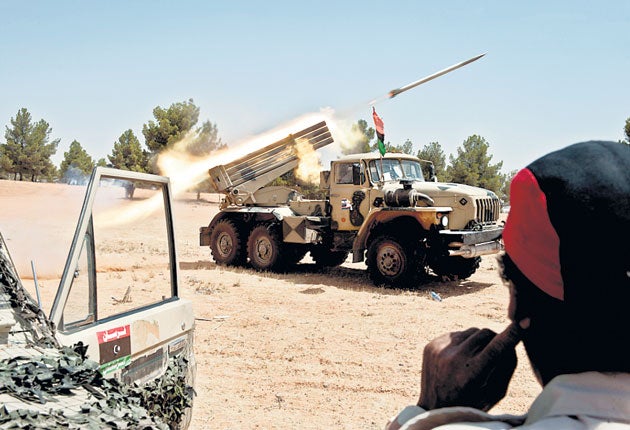Nato strikes at Libya's oil in bid to oust Gaddafi
Most senior British commander says decision to launch attack on Brega works 'was not taken lightly'

Nato forces have attacked Libya's oil facilities for the first time in this conflict in an attempt to starve Muammar Gaddafi's army of fuel, as rebels, following fierce clashes, moved to within 50 miles of the capital Tripoli.
The airstrikes on the complex at Brega, one of the countries' biggest petrochemical complexes and port for export, was designed, says Nato, to prevent regime troops from mounting attacks.
Control of Brega and the adjoining city of Ras Lanuf has changed hands several times in the course of the bitter civil war. It is now under the control of the regime, denying the opposition administration based in Benghazi a highly lucrative source of income.
The most senior British commander involved in the Libya operation, Rear Admiral Russ Harding, told The Independent: "This was not done lightly, we looked at the pattern of life on the ground, and we decided that the only ones benefiting from the fuel were the Gaddafi forces and not local people. And they were using that fuel to carry out attacks on civilians.
"There are commercial aspects to this. Brega and Ras Lanuf could provide a revenue stream for the TNC (Transitional National Council, the rebel administration). But that was not something in our consideration, the decision was taken solely to protect civilians."
Rear Admiral Harding stressed that only the refuelling facilities were being hit and not the oil tanks. Speaking at Nato HQ in Naples, he continued: "It is not the case that this will be affecting babies in incubators at Brega hospital. If the hospital in Brega is being used, it is being done by Gaddafi forces."
The bombing, however, could be seen as a risky strategy for Nato, which has insisted that its forces are avoiding targeting infrastructure. Oil storage terminals at Ras Lanuf were set alight during the early weeks of fighting following the February revolution, and since then there had been an attempt by all sides in the conflict to ensure that the facilities were not affected.
However, although more than 14,000 sorties since military action began had destroyed much of Muammar Gaddafi's armour and artillery, Admiral Harding said: "We have seen them use private cars, trucks, technicals [flatbed trucks with guns mounted at the back] sometimes hundreds at a time.
"By depriving Gaddafi of fuel we are depriving him of mobility. We have seen his forces drive deep down into the desert to pick up supplies, pick up ammunition."
Limiting fuel supplies would prevent the regime troops from carrying out attacks in the eastern front as well as moving to the west, where a rare co-ordinated attack by the rebels has brought their fighters close to Tripoli, with the most advanced in the village of Qawalish, south-east of the city and the mountain village of Kikla.
In the Libyan capital, the deputy foreign minister, Khaled Kaim, declared that Nato's increased bombings represented the "final phase" of the air campaign, aimed clearing a path for the rebels. He insisted that the push "will fail and it is the civilians who will pay the price".
Join our commenting forum
Join thought-provoking conversations, follow other Independent readers and see their replies
Comments
Bookmark popover
Removed from bookmarks